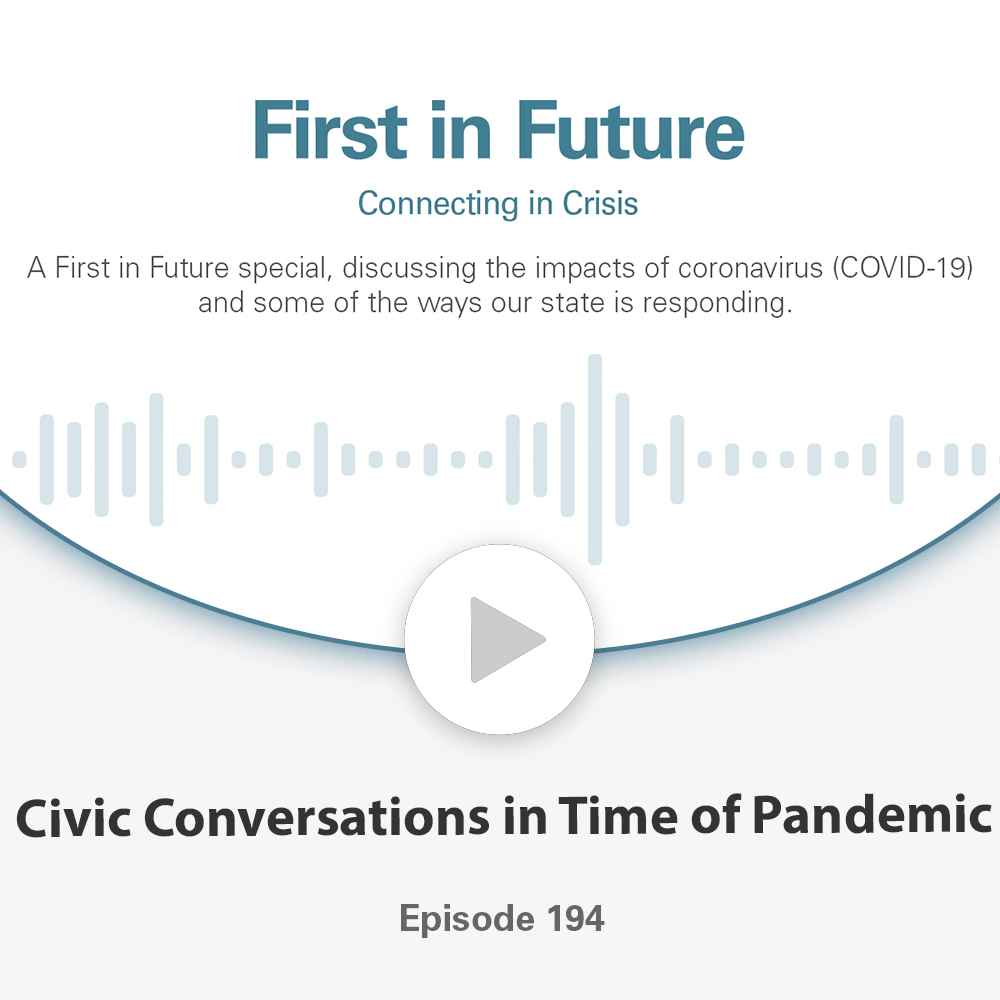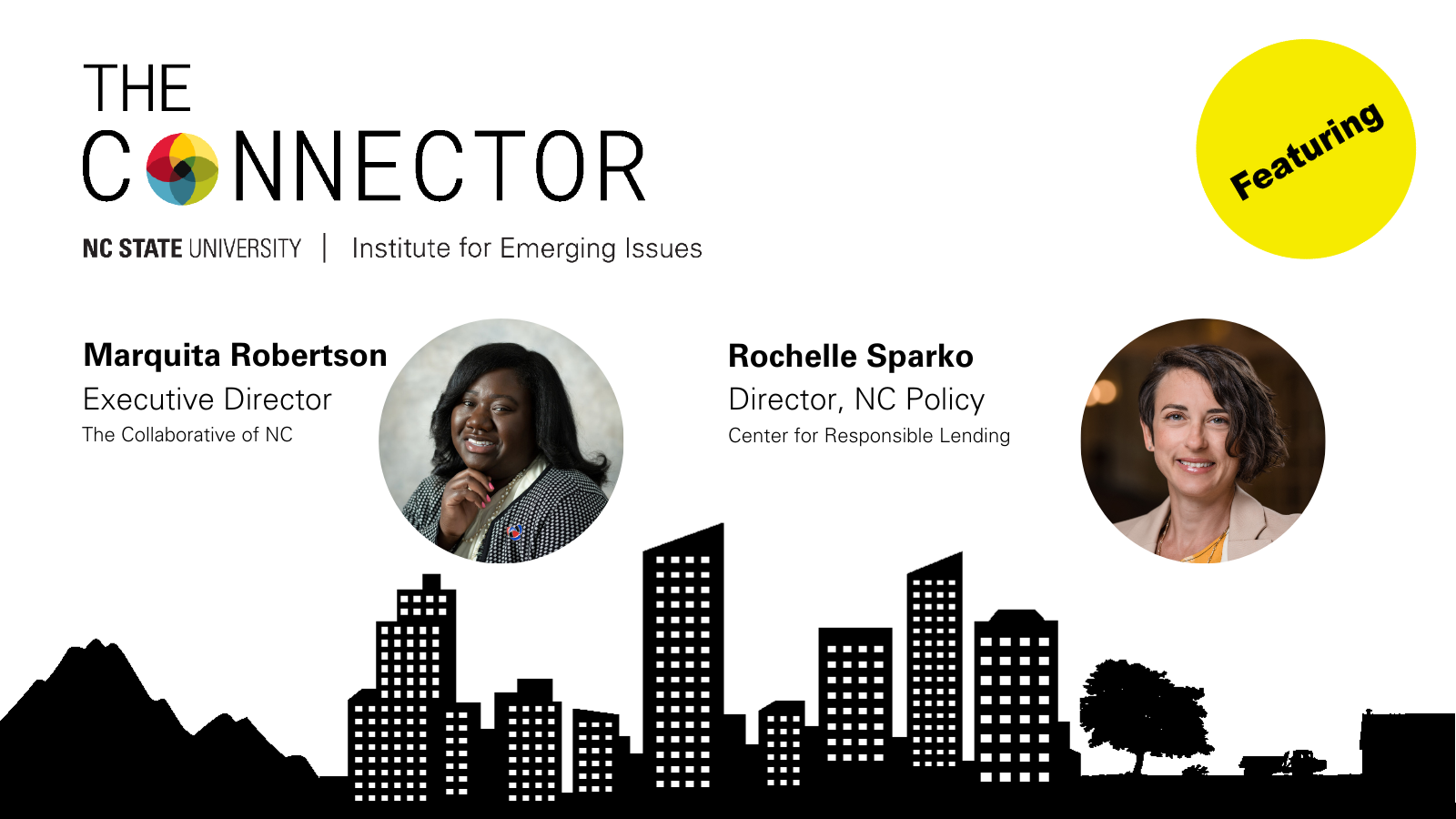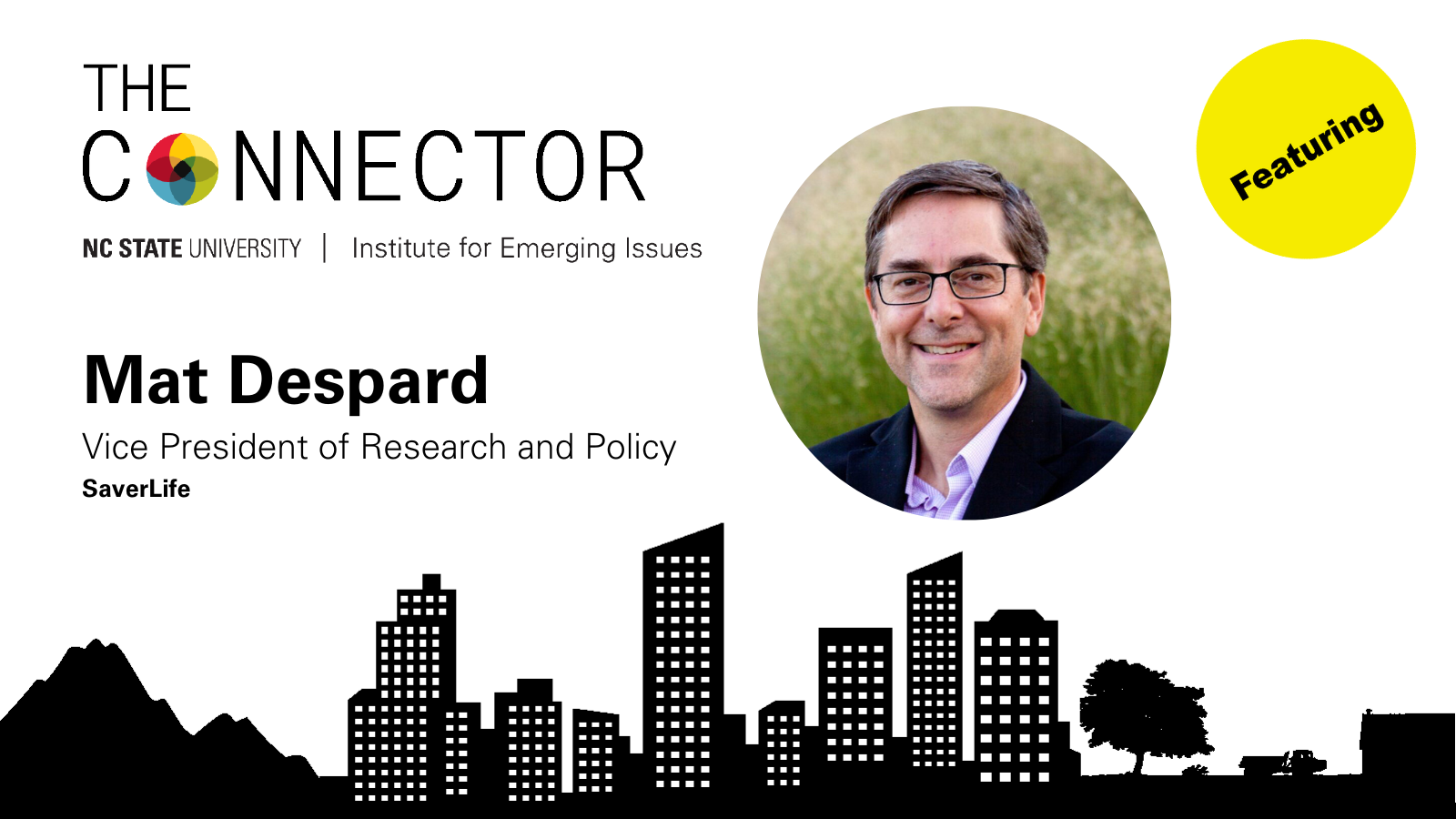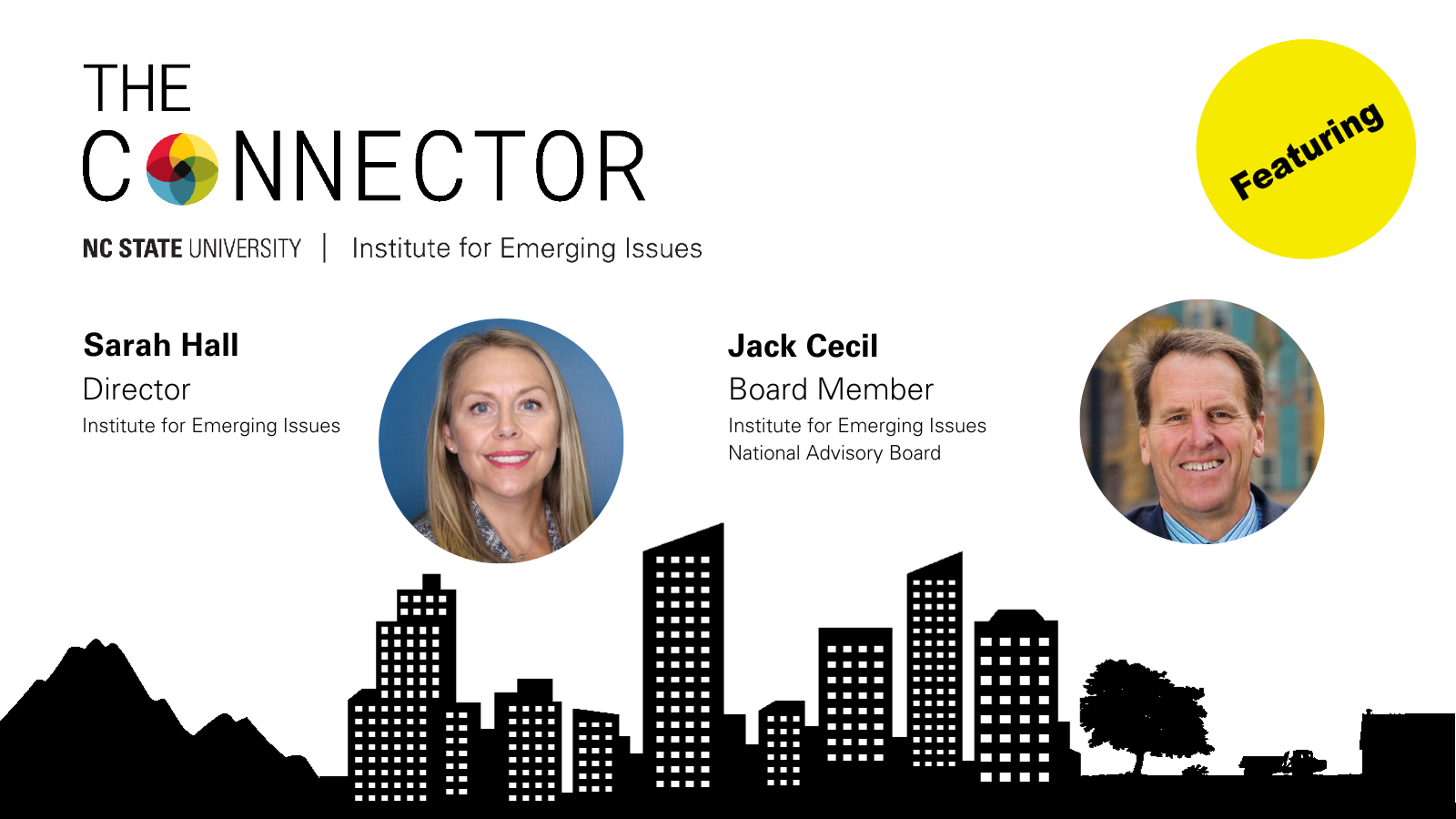Civic Conversations In Time Of Pandemic

 Summary: Leslie Boney, Director of the Institute for Emerging Issues, hosts a series of virtual conversations discussing the impacts of coronavirus (COVID-19) and some of the ways our state is responding.
Summary: Leslie Boney, Director of the Institute for Emerging Issues, hosts a series of virtual conversations discussing the impacts of coronavirus (COVID-19) and some of the ways our state is responding.
Join us for this episode (Civic Conversations in Time of Pandemic) with guests Pearce Godwin (Listen First Project), Cyrus Rad (Class of 2021 Caldwell Fellow at NC State University), L.B. Prevette (Forward Wilkes) and Tru Pettigrew (Tru Access).
*This episode of First in Future was recorded on Thursday, May 28th, and reflects information that was up-to-date at that time.*
View the slides here.
Listen to the podcast or Watch Zoom Video
Highlights & Resources
Why do you believe face-to-face conversation makes a difference?
- Tru Pettigrew: There’s a power in presence and being face-to-face. You can look into someone’s eyes, read body language. Organic and rich insights, connections and solutions can come before and after the dialogue. There are benefits to virtual channels that will carry forward. But there are intangibles that we lose out on without presence.
- Cyrus Rad: Being in the same room gives clues to how people are reacting and thinking that you don’t get virtually. Going virtual has given some tools to supplement in-person contact going forward.
- LB Prevette: You can feel authenticity face-to-face. When we try to write or video chat, we lose that. Face-to-face meetings have a deeper sense of connection because we’ve gone out of our way to meet together, in a place – that shows commitment to each other.
- Pearce Godwin: Social interactions are richer and more powerful when you’re face-to-face. Closer connections help you understand where someone is coming from. Grateful for technology so that we can still connect and even bridge geographic divides. But it will be nice when we can get together again – the connections will be more powerful then.
How has the Listen First Project evolved over the last few weeks?
Pearce Godwin: There was already a lot of energy leading up to the National Week of Conversation. We started collaborating with the Aspen Institute’s Weave project. We pivoted to a rapid response campaign celebrating acts of bravery, caring and connection. Hopefully this is a pause that creates a new birth and we maintain our desire and appreciation for social connection.
What is a weaver? How has your work in Wilkes County changed?
LB Prevette: Weaving was a relatively new idea. For me, that’s just how people live – talking, socializing together. Our town is so good at this. But it’s changed – we prided ourselves on public, informal gatherings. Now, reaching out to people is more intimate. I realize who’s missing/who we aren’t serving when I have to reach out to people individually.
How have you found a new way of establishing place?
LB Prevette: Have used outdoor spaces like backyard for safe gatherings. Stardust Cellars & Taproom supports different community events – created a small business contactless hub for people to order from local businesses safely.
What’s the importance of conversation with people you disagree with?
LB Prevette: Having people who disagree with me challenge my ideas led to a better idea. Important to try to hear the voices you haven’t heard – people only have ignorant or biased views because they’re not hearing those voices. Need to have challenging conversations and “learn aggressively” from each other. “…disagreeing with each other in no way shape or form takes away from each other’s humanity.”
What has this week been like for the people you’re in conversation with?
Tru Pettigrew: There is a desperate need to talk about what’s going on nationally, from lens of public safety, social justice, health human services, and economic growth & development. Have had lots of 1:1s, Zoom calls, phone calls and chat sessions (rather than a group rap session). These talks can be therapeutic. People need that outlet in unstable times.
Why is prayer so important now?
Tru Pettigrew: I was led to start a Facebook Live prayer session every weekday at 8 a.m. I thought I was doing it for other people but it has turned into a blessing for me. People are desperate for consistency, stability right now and are realizing they can trust God’s word.
College is a place where you can learn from people with different opinions; but maybe college conversations have become less robust – what have you noticed?
Cyrus Rad: I’ve noticed the people around me reinforce my beliefs. “What we’ve found is that by creating space for these conversations and intentionally trying to bring people from different backgrounds and different beliefs together, we’re reinvigorating that robust conversation…”
Have been working with Better Angels, College Republicans and College Democrats. It seems like people want to have these conversations when they’re in that space – that’s encouraging. The big goal for us is to get people in those spaces, create an environment where people want to come, bring their perspective, and learn from others.
How will you accomplish that in the future without density?
Cyrus Rad: Have been meeting with Dr. Janice Odom from Caldwell Fellows and group of faculty/staff working to launch the Campus Conversations Project. Just put together a proposal about evaluation of needs on campus for it to work. Plan to use Living Room Conversations model. The biggest challenge is creating a culture that wants to have these conversations.
Is the pandemic making things better with political divisions?
Pearce Godwin: Absolutely. Sense of unity has permeated. We will lose some of it, but I hope we don’t lose all of it. Grateful that asteroid theory has held (if an asteroid comes, we’re on the same team). But we see a tendency back toward division and that’s scary. My passion and drive is to see that being unified becomes closer to the new normal.
How can we change out of this? What have we learned?
LB Prevette: This is a shared experience that can help us find common ground.
Hope that this transition to remote work shows that you can live in rural areas and have the same opportunities that are supposedly constrained to cities.
Still see people who aren’t concerned but I think we’re hearing that amplified more than it’s actually being said.
What will come out of COVID is resiliency over perfection. I hope we look at our communities and find resiliency. This could be the great reset.
How will we be after this?
Tru Pettigrew: I hope we understand that diversity comes in many forms and we need to embrace it. We all have differences but there’s value in them. Have seen the tragedy becoming politicized – stay at home vs. reopen – saw new lines of division being created. “…let’s not be dismissive of other people’s realities and life experiences simply because they’re not our own.”
How do we come out of this better?
Pearce Godwin: “I’m hoping that this pandemic gives many more people that conviction that it’s time to turn the tide of rising rancor and deepening division, to move from isolation to connection.” Hope that this catalyzes us to a “new birth.”
How do we make sure college students have less trauma?
Cyrus Rad: “…if we can be humbled and humanize other people and return to campus more willing to be open and vulnerable to share our stories, share how we coped, then that’s a big step on how we can relate and reconnect to each other.”
- Categories:


